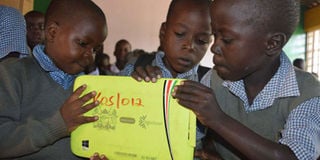Low literacy, numeracy skills worrying

Pupils at Kosawo Primary School in Kisumu use tablets last year. Kosawo was among the pilot schools in the digital literacy programme implemented by the Ministry of Education. PHOTO | FILE | NATION MEDIA GROUP
What you need to know:
Study found that repetition is still rife in public schools and there was almost no difference between boys and girls regarding their fluency in reading.
Less than 20 per cent of learners are able to read and tell the date on the calendar and read a clock face to indicate the hour and minutes correctly.
A conscious decision has to be made to build the capacity of teachers in upper primary school to handle these learners to ensure consistency.
Teachers should be encouraged to use the time allocated on the timetable for clubs and societies to reinforce what is happening in class outside the classroom.
The findings contained in the Uwezo 2016 report released last year, dubbed Beyond Basics Study, are as startling today as they were then, and it should be on the Ministry of Education agenda of 2018.
The study was undertaken in 200 schools in 10 sub-counties across the country. It assessed writing, listening and spelling, as well as learners’ ability to perform mathematical (numeracy) problems that included operations, combined with critical thinking skills.
From the key areas of interest, the findings included low competency rates for division and writing for Standard 5 and 6, as well as less than 50 per cent of Standard 5 and 6 learners having spelling competencies when assessed using Standard 4 work.
It was also found that repetition is still rife in public schools and there was almost no difference between boys and girls regarding their fluency in reading.
READ
And the results are appalling when we arrive at the conclusion that less than half of the students who demonstrated fluency in reading did not understand what they read!
Less than 20 per cent of learners are able to read and tell the date on the calendar and read a clock face to indicate the hour and minutes correctly. From the assessment, only three out of 100 children got a critical thinking question right.
These assessment results have far-reaching implications on the action framework for the ministry’s investment. Now that we have moved closer to gender parity in enrolment and learning outcomes, the minority needs to shift gears to enhance individual and collective learning gains.
The ministry and the Teachers Service Commission (TSC) need to figure out how to handle the transition processes for learners who have gone through Tusome and Priede, which were only being offered at lower primary school.
A conscious decision has to be made to build the capacity of teachers in upper primary school to handle these learners to ensure consistency. If this does not happen, the country is likely to drop the relay baton and the initial investment made is bound to go to waste.
PROFESSIONAL DEVELOPMENT
The implementation of the framework for teacher education in Kenya developed in 2016 needs to take effect.
Hopefully, substantial investment will go into specific literacy and numeracy support for teachers in upper grades as part of their continuous professional development to safeguard the investment already made at lower grades.
Learners who have transited to higher grades and are lagging behind need support not only at school (classroom and play) but also at home.
Parents, guardians and caregivers need to be sensitised to help to connect classroom learning and contextual or environmental occurrences and activities. Children need to learn how portions of food served relate to division or multiplication. This type of engagement will help to anchor the learning and eliminate the abstract and/or blind spots in the process.
Also, teachers should be encouraged to use the time allocated on the timetable for clubs and societies to reinforce what is happening in class outside the classroom. Schools need to invest in organised play for purposes of nurturing skills and talent, but also as a way of reinforcing what children have learnt in the classroom.
CREATIVITY
The utilisation of locally available material for learning and play leaves a lasting imprint on the mind of the learner and this should be encouraged for it can only be a function of the teacher’s creativity and innovativeness.
The education sector ought to find a new cause for learning. Schooling for employment has lost its glitter and, therefore, the nation needs to find a new reason for sending children to school.
The first generation of nationalists and public servants went to school to gain knowledge and skills to replace the leaving colonial masters and their attendant workforce. The second and third followed the same path. The fourth generation is now stuck unemployed and frustrated.
SERVICE DELIVERY
The Quality Assurance and Standards officers from the ministry headquarters to the grassroots at the points of service delivery need to move away from the after-the-fact form of assessment for purposes of early diagnosis and remedy on issues that hinder learning and improvement of learning outcomes.
We need to stand up for our children and act differently.
Mr Wesaya is the country director, Discovery Learning Alliance-Kenya. [email protected].





